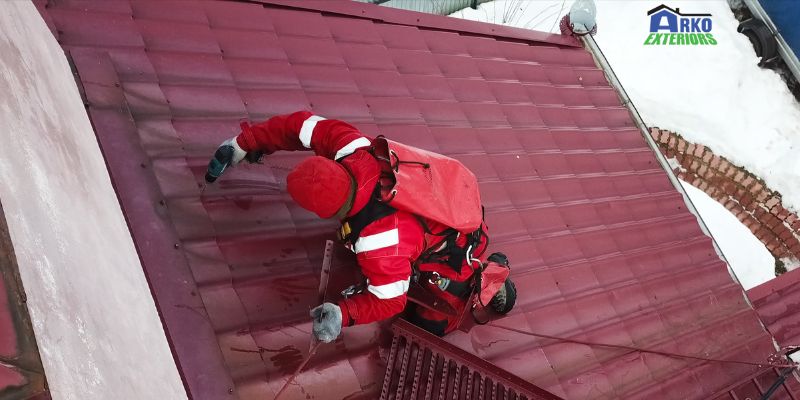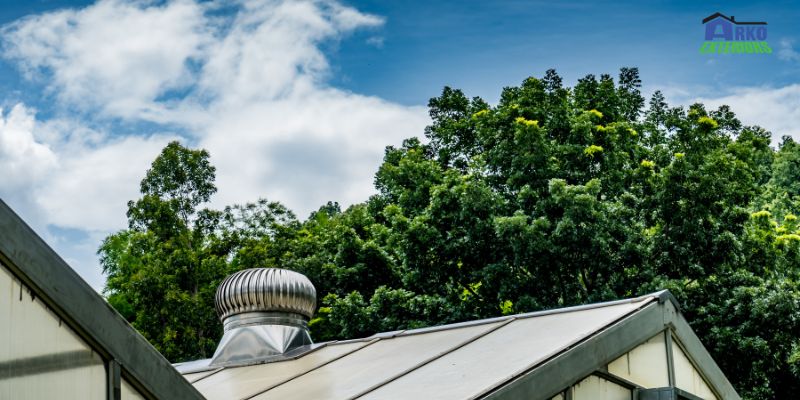Installing a new roof can be an overwhelming task for many homeowners. With so many options available, it can be difficult to know where to start. However, choosing the right roof is crucial as it protects your home from the elements, adds value to your property and enhances its overall appearance.
When it comes to installing a new roof, there are several important factors that you need to consider.
Here’s what to look for when installing a roof…
1. Material Quality:

The quality of the roofing material is one of the most important factors to consider when installing a roof. There are many different types of roofing materials available, each with its own set of advantages and disadvantages.
It’s important to choose a roofing material that is appropriate for the climate and weather conditions in your area, as well as your budget and aesthetic preferences. Some common roofing materials include asphalt shingles, metal roofing, tile roofing and wood shakes.
When selecting a roofing material, be sure to choose a high-quality product that is durable and long-lasting. Cheap, low-quality roofing materials may save money upfront but can end up costing more in the long run due to frequent repairs and replacement.
2. Proper Installation:
Proper installation is essential for ensuring that a roof functions properly and provides optimal protection for the building. A poorly installed roof can lead to leaks, moisture damage and other issues that can compromise the integrity of the building.
It’s important to hire a professional roofing contractor with experience and expertise in installing the type of roofing material you have selected. A skilled roofing contractor will be able to ensure that the roof is properly installed, with attention to detail and a focus on quality workmanship.
Proper installation includes ensuring that the roof is properly ventilated, that the flashing and sealant are installed correctly and that the roof is properly aligned and level. A well-installed roof will provide many years of reliable protection for the building and its occupants.
3. Proper Ventilation:

Proper ventilation is critical to the long-term health of a roof system. Without adequate ventilation, moisture can become trapped in the attic or roof space, leading to mold growth, wood rot and other issues that can compromise the structural integrity of the roof.
Proper ventilation involves ensuring that there is sufficient airflow between the attic and the outside environment, which can help to regulate temperature and humidity levels. This can be achieved through the installation of vents, such as ridge vents, soffit vents or gable vents.
A skilled roofing contractor will be able to evaluate the ventilation needs of your roof system and recommend the appropriate ventilation solution. Proper ventilation can also help to improve energy efficiency, as it can help to reduce heat buildup in the attic which can transfer to the living spaces below.
4. Weatherproofing:
Proper weatherproofing is essential for ensuring that a roof system can withstand the elements and provide reliable protection for the building. This involves installing the appropriate underlayment, flashing and sealant to prevent water intrusion and moisture damage.
The underlayment is a waterproof barrier that is installed directly on the roof deck before the roofing material is applied. It helps to prevent water from seeping into the underlying structure and also provides an additional layer of protection against wind-driven rain and other forms of moisture.
Flashing, meanwhile, is a material that is installed around roof penetrations, such as chimneys, skylights and vents, to prevent water from entering these vulnerable points. Sealant is applied to seal the edges and seams of the roof (as well as around any roof penetrations) to create a watertight seal.
Proper weatherproofing is critical to preventing leaks which can lead to moisture damage, mold growth and other issues. A skilled roofing contractor will take great care to ensure that the roof system is properly weatherproofed with attention to detail and a focus on quality workmanship.
Summary:
In conclusion, installing a roof is a significant investment and a crucial aspect of any building project. When considering roofing materials, it’s essential to consider the durability, energy efficiency and overall design of the roof. Additionally, it’s imperative to hire a professional and experienced roofing contractor to ensure the job is done correctly and to avoid future problems. By taking these factors into account, you can ensure that your roof will provide your property with the protection it needs for years to come.

